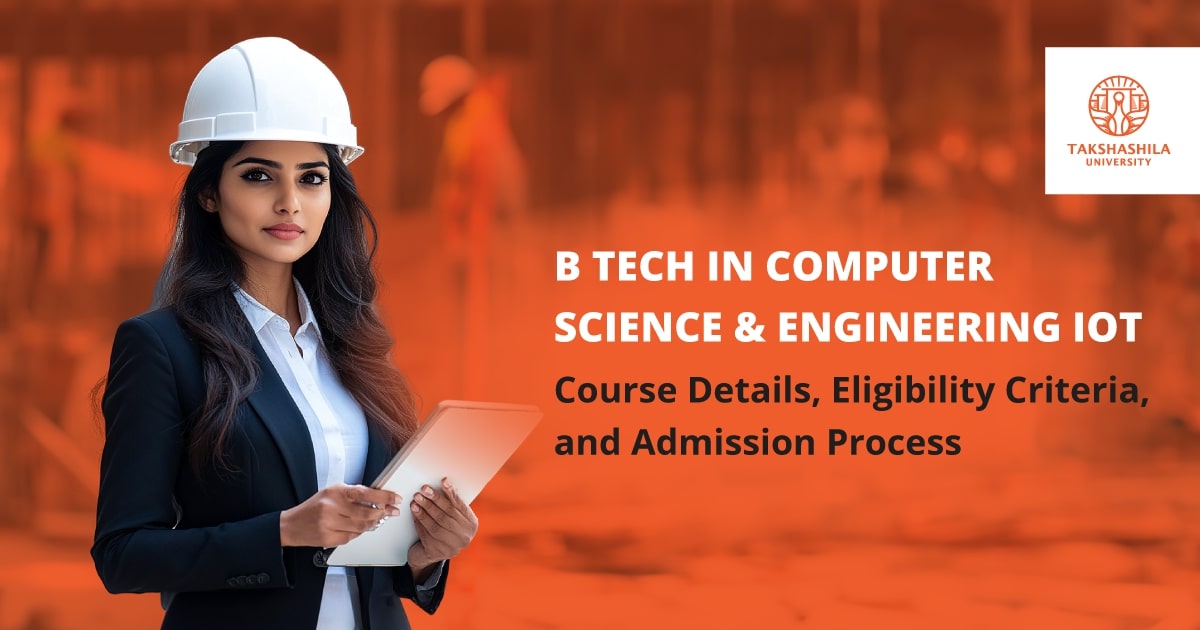Introduction
The B-Tech in Computer Science and Engineering the Internet of Things (IoT) at Takshashila University program is concerned with designing, developing and implementing IoT systems.
This focused degree course enables students to enter the newly emerging sphere of IoT, where they will deal with devices, systems, and data to create smart integration.
This article will also investigate the B Tech in Computer Science and Engineering IoT program, including syllabus, eligibility and admission requirements.
In addition, we will orient you on career options and salary expectations for the graduates so that you comprehend the importance and prospects of the degree.

What is B-Tech in Computer Science and Engineering focusing on the Internet of Things (IoT)?
This is a fascinating field as the writer embarks on his B-Tech in Computer Science and Engineering, focusing on the Internet of Things (IoT).
However, as the speed of technological innovations cannot be underestimated, IoT has become one of the most vital trends, connecting most devices to the internet and allowing them to interact.
This degree not only provides the students with the basic theory in computer sciences and engineering but also encourages them to develop the best solution in the field, disrupting society and its interaction with the environment through internet and services.
Think about smart homes, self-driving cars, and wearables to enrich our lives and make them smarter, greener, and more comfortable. When students engage in this subject, they gaining knowledge of technology and become the architects of the future.
What is the Difference Between CSE and CSE IoT
| Aspect | CSE (Computer Science and Engineering) | CSE IoT (Computer Science and Engineering with IoT) |
| Core Focus | General computing principles, software development, algorithms, and system design. | We are integrating computing with IoT technologies, focusing on smart devices, connectivity, and data exchange. |
| Key Subjects | Data Structures, Algorithms, Operating Systems, Computer Networks, Database Management, Software Engineering | IoT Architecture, Embedded Systems, Sensor Networks, Wireless Communication, IoT Security, Data Analytics |
| Skills Developed | Programming, system design, software development, problem-solving, database management | IoT systems design, sensor interfacing, data processing, embedded programming, real-time data management |
| Applications | Software development, web development, cybersecurity, database management, artificial intelligence | Smart homes, industrial automation, wearable technology, smart cities, healthcare monitoring |
| Laboratories | Programming labs, software development labs, network labs | IoT labs, embedded systems labs, sensor networks labs, wireless communication labs |
| Career Opportunities | Software Engineer, System Analyst, Database Administrator, Network Engineer, AI Specialist | IoT Developer, Embedded Systems Engineer, IoT Architect, Smart Systems Designer, IoT Data Analyst |
| Industry Demand | High demand across various tech sectors, including IT, finance, healthcare, and e-commerce | Growing demand in IoT-specific industries such as smart devices, automotive, healthcare, and smart cities |
| Emerging Trends | Cloud computing, AI and machine learning, cybersecurity, big data | 5G connectivity, edge computing, smart sensors, IoT security, real-time data analytics |
| Tools and Technologies | Java, C++, Python, SQL, Linux, Git, Docker | Arduino, Raspberry Pi, MQTT, IoT platforms (e.g., AWS IoT, Azure IoT), wireless communication protocols |
| Interdisciplinary Integration | Mainly integrates with software engineering, data science, cybersecurity | Integrates with electronics, embedded systems, telecommunications, and data analytics |
Program Overview: Making the Connections for Tomorrow
B Tech in Computer Science and Engineering IoT:
Duration: Usually four years (8 semesters).
Year 1:
- Programming Fundamentals: Basics of coding and software development.
- Introduction to Cyber Security: Overview of cybersecurity principles and practices.
- Mathematics for Computing: Essential mathematical concepts for computer science.
Year 2:
- Data Structures and Algorithms: Core concepts in data organisation and algorithm development.
- Network Security: Techniques and tools for securing networks.
- Database Systems: Design and management of database systems.
Year 3:
- Cryptography: Methods of securing information through encryption.
- Operating Systems: Understanding the role of OS in security.
- Ethical Hacking: Learning to identify and exploit vulnerabilities ethically.
Year 4:
- Cyber Forensics: Techniques for investigating and responding to cyber incidents.
- Capstone Project: Application of knowledge in a significant project.
- Internship: Practical industry experience through internships.
Practical Training: Includes lab work, industry internships, and hands-on projects to gain practical experience.
Key Skills developed: Although there is a strong focus on IOT system design, skills in data analytics and embedded systems are also acquired.
Core Subjects and Skills
1. Core Subjects:
IoT Architecture: Fundamentals of designing IoT functions and IoT structures.
Embedded Systems: Integration of software and hardware in the context of IoT devices.
Wireless Communication: The various methodologies for interconnecting IoT devices without physical wires.
Data Analytics: Several techniques for interpreting the information generated by IoT devices.
2. Skills Acquired:
Technological Skills: Credentials for developing and deploying IoT systems and solutions.
System Design: Skill in combining all devices, networks, and information to create intelligent surroundings.
Research: skills in identifying and finding solutions to issues found within IoT systems.
Management: Understanding of IoT project life cycle.
3. Additional Skills:
English Mastery: The ability to express technical jargon related to IoT.
Critical Thinking: Ability to examine data and systems in the context of IoT.
A Quick Glimpse of Curriculum Highlights: Specialized and Practical
Computer Science and Engineering IoT Curriculum:
| Year | Subjects | Description |
| 1 | Mathematics, Introduction to Programming, Fundamentals of IoT | Foundation courses in IT and IoT principles |
| 2 | Embedded Systems, Wireless Communication | Intermediate courses focusing on hardware-software integration and connectivity |
| 3 | IoT Architecture, Data Analytics | Advanced courses in IoT system design and data analysis |
| 4 | Capstone Project, Internship | Practical application through projects and real-world experience |
Eligibility Criteria: Who Can Apply?
1. Educational Qualification:
Completion of Higher Secondary Education (10+2): Must have studied Mathematics and Science.
Minimum Marks:
Typically, an aggregate of 50-60% in mathematics and science subjects is required.
Entrance Exams:
1. JEE Main: A national-level standard engineering entrance test.
2. BITSAT: Engineering admission test for the BITS campuses.
3. State-Level Exams: Different state engineering entrance exams.
Application on the management of the entire admission process: What you should do to get enrolled
2. Research and Apply:
Find universities offering B Tech in Computer Science and Engineering IoT courses and apply online to these institutions.
1. Entrance Exam:
Study and sit for the compulsory admission tests.
2. Document Submission:
Submit entrance exam results and academic documents.
3. Counseling and Admission:
Go through the counselling process, choose the course you intend to pursue and complete the admission process.
Reasons to Consider B Tech in Computer Science and Engineering IoT
Here are the following reasons you should consider choosing B Tech in Computer Science and Engineering IoT,
Specialised Approach:
The curriculum is aimed at IoT, which helps students acquire the skills of connecting devices, systems, and data.
High Demand:
There is a great demand for graduates as the world is moving towards IoT and bright workspace creations.
Hands-On Experience:
Possibility of doing practical work on projects and gaining experience through internships and capstone projects.
Salary Expectations:
B Tech in Computer Science and Engineering IoT graduates can expect competitive salaries. Here are some roles and their average annual salaries in INR:
- IoT Developer: ₹7,00,000 – ₹15,00,000
- Embedded Systems Engineer: ₹6,50,000 – ₹14,00,000
- IoT Architect: ₹9,00,000 – ₹20,00,000
- Smart Systems Designer: ₹8,00,000 – ₹18,00,000
- IoT Data Analyst: ₹7,50,000 – ₹16,00,000
Career Opportunities: Future Prospects
Potential Careers:
1. IoT Developer: Create IoT systems and applications.
2. Embedded Systems engineer: Use hardware and software knowledge for the Internet Of Things.
3.Data analyst: Use the data gathered by the Internet of Things gadgets and processes for decision-making.
4. System architect: Develop IoT systems and solutions for clever environmental purposes.
Job Sectors:
These are the job sectors on the line you can choose after completing yourB Tech in Computer Science and Engineering IoT.
1. Technology: Engage with companies involved in IoT development and integration of solutions and products.
2. Manufacturing: Provide IoT services to the manufacturing parlors.
3. Healthcare: Design IoT systems for patient health and wellbeing management.
4. Smart cities: Geared towards intelligent city applications such as light use and traffic control.
Salary Ranges:
| Role | Average Salary (INR) |
| IoT Developer | 6,00,000 – 14,00,000 |
| Embedded Systems Engineer | 7,00,000 – 16,00,000 |
| Data Analyst | 5,00,000 – 12,00,000 |
| System Architect | 8,00,000 – 18,00,000 |
Companies You Can Aim For
Top Employers:
1. Tech Giants: The IoT is a quickly growing field, and there are now jobs related explicitly to IoT development and implementation in major corporations like Google, Microsoft and Amazon.
2. Manufacturing Firms: Mentioned companies like Siemens and General Electric implement IoT in intelligent manufacturing systems.
3.Healthcare Companies: Philips and Medtronic, among others, are some of the companies that have adopted IoT solutions in patient monitoring and care.
4. Smart City Initiatives: Cisco prepares IoT solutions for innovative city initiatives and IBM.
Why Takshashila University? For the B Tech in Computer Science and Engineering IoT programme
Embark on an incredible journey at Takshashila University, which offers a B.Tech. in Computer Science and Engineering, and prepare yourself with a strong engineering background.
As one of the leading engineering colleges in Chennai, we offer our students a curriculum based on theoretical knowledge and practical experience.
We are the best engineering college in Thindivanam because of the reason,
1. Cutting-Edge Curriculum:
Innovative Courses: The expansion of knowledge in the field of IoT is integrated to incorporate modern development into market trends and teach the students.
Hands-On Learning: High implementation of projects and internships and integration of industry scenarios to expose students.
2. Experienced Faculty:
Industry Experts: Teachers with real-world experience in IoT and other fields.
Research Opportunities: There are job opportunities for students and chances to participate in thematic experiments and the development of new IoT devices.
3. Strong Industry Connections:
Corporate Partnerships: Multi-faceted collaboration agreements with one or more accredited organisations relevant to the Internet of Things for internships, projects, placements, and other reasons.
Guest Lectures and Workshops: Seminars with field practitioners to introduce students to current practices and trends in the industry.
4.State-of-the-Art Facilities:
Advanced Labs: Today, companies are well-armed with the tools and technology needed to develop IoT.
Innovation Centres: Areas on campus focused on developing students and their ideas into successful startups.
Come take our journey with us. It encompasses internships at some of the top tech companies, where you can earn up to INR 8 lakhs in stipends, along with the guidance of some of the best mentors in the industry.
You can be assured that with strong campus placements and scholarships for sports and academics,
Leap—your future begins here at Takshashila University!
Conclusion
With the market rapidly growing in the Internet of Things, a degree in BIT with specialization in Computer Science and Engineering and specialisation in Internet of Things will provide you with many opportunities.
As a result of their curriculum, which teaches theory alongside practice, students are prepared for the challenges of dealing with various concerns within this fast-growing field. This comprehensive program’s approach is anchored on specifics or practical experiences through project work, internships, or working with key industry players, making learning through this program challenging and fulfilling.
For any young engineer aspiring to make his/her career in technology, the first step towards a future full of opportunities in the rapidly growing field of IoT is to know the basic details of the course, the eligibility criteria, and the admission procedures.
Comment below with your thoughts on how much you are interested in pursuing a B Tech in Computer Science and Engineering IoT program.
FAQ
1. What can one do to further their career after obtaining the B.Tech in IoT?
Graduates can find jobs as IoT developers, embedded system engineers, data analysts, and system architects in technology manufacturing, health care, and smart city developments, among other fields.
2. Which topics are essential to the curriculum of the IoT?
The major topics are explicitly IoT architecture, embedded systems, wireless communications, and data analytics. Thus, the curriculum links a specific theoretical framework with the practical use of certain types of applications.
3. What must I do to prepare for the B Tech IoT entrance exams?
Before any coding, try to expand your knowledge of computers using mathematics, science, and programming basics. Prepare study materials, past CSS papers, and coaching classes for better preparation.
4. What are the usual costs of the B Tech in IoT program?
Tuition fees are relatively affordable, costing between INR 1,50,000 and INR 3,00,000 per year. Books, materials, and living expenses are other expenditures that need to be factored in.
5. What are the benefits of learning under Takshashila University for a B Tech IoT program?
Takshashila University provides an innovative curriculum, practical training, highly-skilled faculty members, industry linkages, and the latest infrastructure-wise education in IoT.






